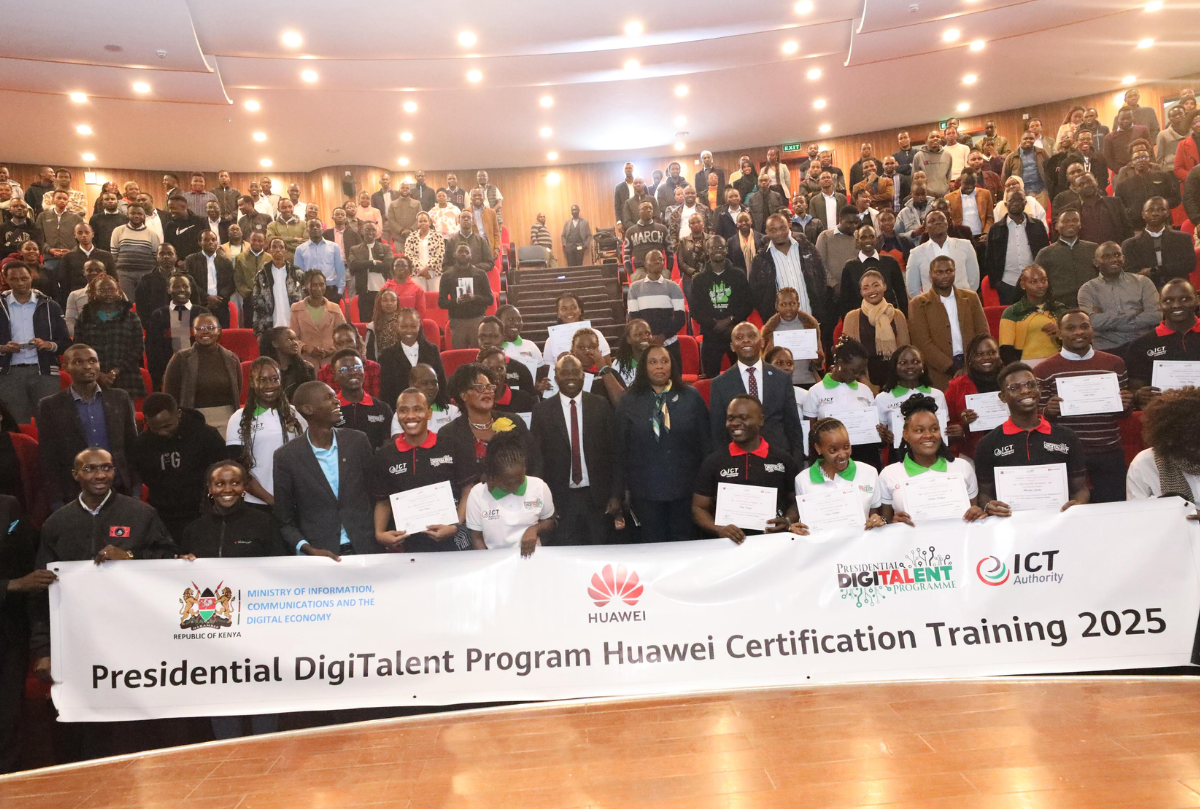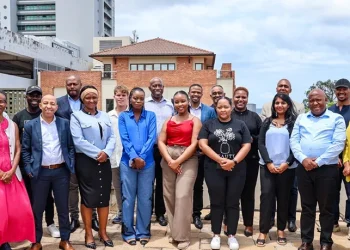The 9th cohort of the Presidential Digital Talent Programme (PDTP) graduated recently, with 400 trainees completing a rigorous Huawei Training and Certification Program. The ceremony was held at the University of Nairobi, celebrating the next wave of digitally skilled professionals.
The government-backed initiative trains youth through partnerships with global tech companies. Since 2014, the programme has produced over 3,300 certified graduates with hands-on experience in critical technology areas. This latest cohort completed rigorous Huawei training and certification programs spanning multiple months.
Kenya Digital Skills Training Bridges Academic-Industry Gap
The Ministry of Information, Communications, and the Digital Economy leads this comprehensive programme. Implementation comes through the ICT Authority working alongside Huawei Technologies. Their focus centers on closing the divide between classroom learning and real-world tech applications.
Students receive training in networking, cybersecurity, artificial intelligence, and software development. These areas align directly with Kenya’s broader digital transformation strategy. The skills gained address urgent industry needs across multiple sectors.
Government Officials Push Tech Innovation Leadership
Principal Secretary for ICT and Digital Economy John Tanui addressed the graduates during the ceremony. He emphasized their role beyond traditional job seeking. Instead, he urged them to view themselves as Kenya’s digital future builders.
“This cohort of graduates is entering the workforce at a crucial time for Kenya’s digital economy,” Tanui stated. He challenged them to create innovative solutions, build startups, and compete globally in the tech economy.
Mary Kerema, Secretary for ICT, E-Government and Digital Economy, joined the ceremony. ICT Authority Acting CEO Zilpher Owiti also shared insights on the programme’s impact since inception.
Kenya Tech Talent Development Shows Strong Results
The Presidential Digital Talent Programme demonstrates Kenya’s commitment to systematic skills development. Since starting in 2014, the initiative has maintained steady growth in graduate numbers. Each cohort receives increasingly sophisticated training aligned with emerging tech trends.
According to official government sources, the programme exemplifies successful public-private partnerships. The collaboration model between government institutions and global tech companies provides students with industry-standard certifications.
Kenya faces significant digital skills shortages across multiple sectors. The World Bank estimates that 50 to 55 percent of all Kenyan jobs will require foundational digital skills by 2030. This makes programmes like PDTP essential for meeting future workforce demands.
Huawei Partnership Expands Kenya Tech Education Access
The partnership between Kenya and Huawei extends beyond basic training delivery. Students gain access to cutting-edge technology platforms and real-world project experience. The certification programmes meet international standards recognized across global tech markets.
Huawei’s ICT Academy programme operates in partnership with multiple Kenyan institutions. Universities including Kenyatta University and the Open University of Kenya offer these specialized courses. The expansion reaches various counties through satellite campuses and training centers.
Kenya Cybersecurity and AI Skills Development Gains Momentum
The latest PDTP cohort received extensive cybersecurity training addressing critical industry gaps. Kenya’s Cyber Security Strategy 2025-2029 identifies workforce development as a top national priority. Yet most organizations struggle to find qualified professionals.
Artificial intelligence training forms another key component of the curriculum. Kenya recently launched its AI Strategy 2025-2030, requiring skilled professionals for implementation. The government recognizes AI as crucial for economic competitiveness across sectors.
Students also gained networking expertise essential for digital infrastructure development. Kenya’s National Optic Fibre Backbone Network requires skilled technicians for maintenance and expansion. These graduates help address technical workforce shortages in telecommunications.
Public-Private Partnership Model Shows Promise for Tech Training
The PDTP demonstrates effective collaboration between government institutions and global technology companies. This model provides students with industry-relevant skills while meeting company talent pipeline needs. Both parties benefit from the structured approach to workforce development.
Government investment in youth tech training continues growing annually. Budget allocations for digital skills programmes increased significantly over recent years. The returns show in improved graduate employment rates and startup formation numbers.
Private sector participation brings real-world context to academic learning. Companies provide equipment, training materials, and expert instructors. Students gain exposure to current industry practices and emerging technology trends.
The programme’s expansion plans include additional technology partners and training specializations. Cloud computing, data analytics, and digital marketing represent areas for future cohort development.















